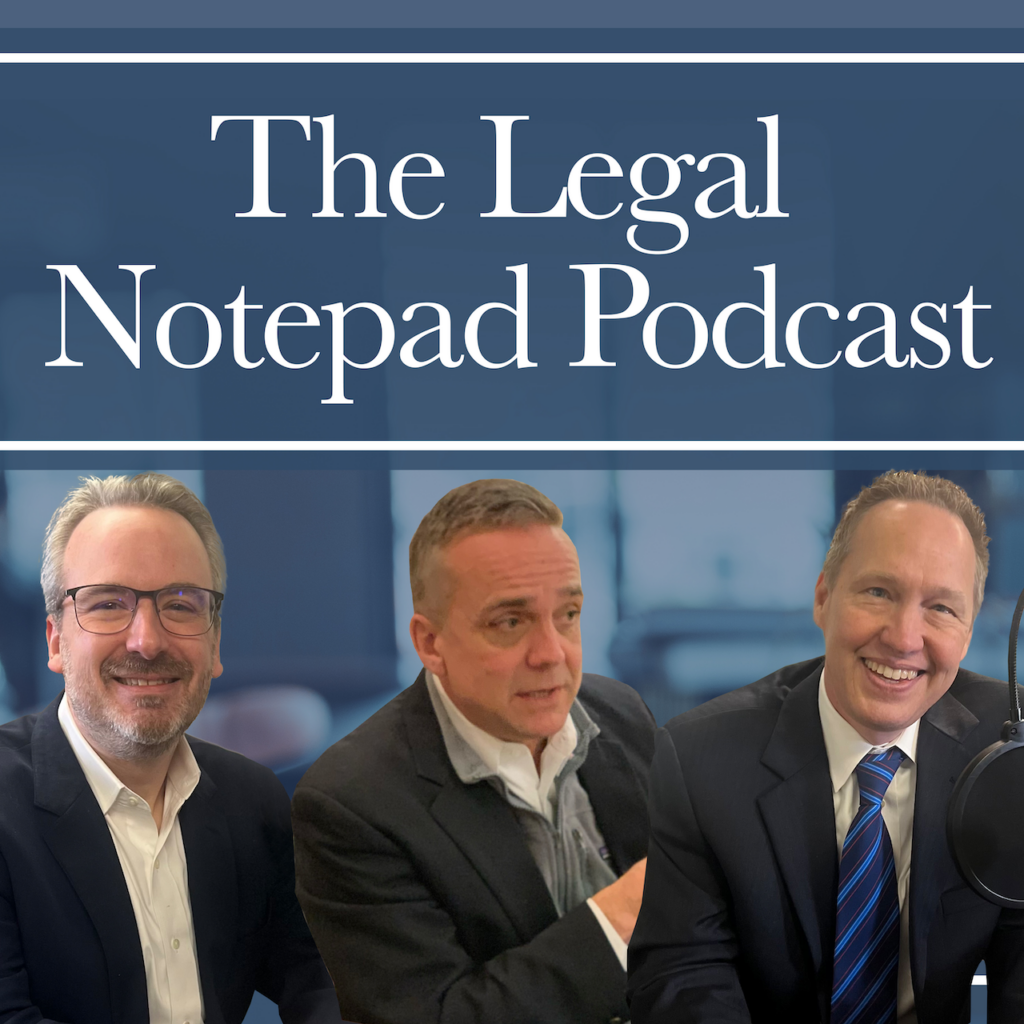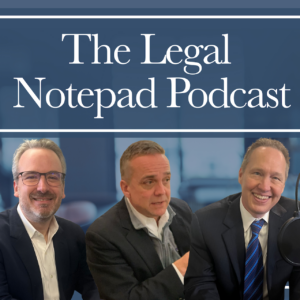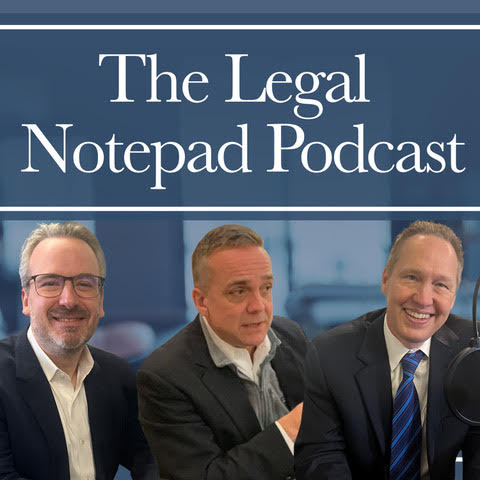Episode 14: Louisville attorneys Rob Mattingly and Kevin C. Burke are happy to provide an opportunity for 1 hour of ethics for Kentucky continuing legal education credit. Rob and Kevin are joined by Lauren Byrn and attorney Nina Couch. Nina teaches professional responsibility at the Brandeis School of Law. She also has a private practice. This is her first time on a podcast!
Editor’s Note: If you are an attorney and would like CLE credit for this episode, visit the Kentucky Justice Association website, click the Education and Training tab and look for the podcast.
TODAY’S LEGAL QUESTION:
Lauren asks, “One of the national, legal listservs had a lot discussion about nonlawyers owning law firms. Does Kentucky have a rule on this?”
Kevin comments how this is a fascinating topic and one that will be greatly discussed in the future. Rob asks Nina to provide some brief information about herself and then explain Kentucky’s Rule 5.4.
Nina was an accountant before going to law school. She’s taught professional responsibility at UofL’s Brandeis School of Law a couple of times. She was a visiting assistant professor, teaching professional responsibility and property. Now she’s there part-time in current capacity, having also taught mediation. Her private firm is Couch Law Office, PLLC, in Louisville. She focuses primarily on consumer protection and personal injury claims.
Nina explains that the ABA model rule Rule 5.4 prohibits nonlawyers from sharing in attorney fees with lawyers. It also precludes nonlawyers from having any ownership interest in a law firm. Kentucky has a similar Rule 5.4, however, in very limited circumstances, such as a lawyer death and the transfer of a law firm. It could also be allowed in the purchase of a law practice, in accordance with Rule 1.17. There’s also a provision for a profit-sharing plan, as long as it’s not tied to a per-case attorney fee.
The History of Rule 5.4
It’s to protect the lawyers independence and judgement. It’s also a safeguard to protect the core values of our legal profession. The ABA adopted Rule 5.4 in 1983. Nina points out that it actually goes back to 1908 when the ABA codified its first set of cannons.
The law has changed over the years, most recently with the significant advances in technology including AI. There has been conversation focused on modernizing 5.4 and access to justice to underserved, potential clients. Adding nonlawyers might assist in addressing the issues.
Law firm capital and innovation are also influencing the conversation. Law firms are prohibited from raising capital from venture capital firms, private equity or nonlawyers.
Rob and Kevin comment on how different the practice of law has become, even since they both started practicing. Business and commerce has also changed. Hedge funds and other investors see an opportunity make money, if they were allowed to invest in law firms.
The Conversation Has Started
Nina notes the ABA has tended to resist changes to Rule 5.4. In 2022, it adopted Resolution 402, noting the inconsistency with core values, were nonlawyers to share in the legal fees or ownership/control of the practice. It cites to the core principles of the practice of law including loyalty, competence and confidentiality.
The Association of Professional Responsibility Lawyers, in December of 2024, wrote a letter to the ABA. They advocated from a modernization of Rule 5.4. They view the involvement of nonlawyers as being inevitable, in legal delivery systems, while maintaining regulations protecting consumers.
The conversation has definitely started. Arizona entirely eliminated its Rule 5.4. Utah has also looked at this issue.
Rob comments on the adage: Those who fail to plan, plan to fail. It seems like the inevitability stated in the December letter, seems quite plausible. Kevin notes leaving the rule as is, is a decision. As technology and other key, societal factors evolve, the legal world is going to change, based only on technology. The decision to update the rule or leave it as is, is a choice that brings consequences.
The Current Landscape
We’re transitioning into a segment dealing with how various states are proceeding. Lauren also suggests we include a discussion on how AI comes into play. Speaking of AI, we’re joined by ChatGPT.
Nina begins by noting the District of Columbia was the first to change Rule 5.4, in 1991. It was a limited change. In 2013, the ABA issued formal opinion 464, Division of Legal Fees With Other Lawyers Who May Lawfully Share Fees With Nonlawyers. It clarified that a lawyer practicing in a model rule state didn’t violate 5.4 if they shared fees with a DC lawyer.
In 2020, the landscape changed regarding 5.4. Utah and Arizona both made changes to their Rule 5.4. Arizona eliminate the fee-sharing prohibition and allowed nonlawyers to own law firms, as Alternative Business Structures (ABS).
Utah approved a 7-year regulatory sandbox. This will provide room for experimentation. Different business structures could involve the delivery of business services. They could be owned my nonlawyers, a mix of lawyers and nonlawyers and situations in which nonlawyers are providing legal services under strict regulation and oversight. Utah is considered a ABS Plus ULP.
In Arizona, however, the legal work is still required to be done by a lawyer, even though the entire ABS could be owned by nonlawyers. A regulatory structure is involved, requiring the ABS to appoint a compliance lawyer.
Washington state, in December of 2024, issued an order with a time-bound, data-driven pilot test of 5.4. It will allow companies and non-profit entities to offer legal services under carefully monitored conditions, according to the Washington State Bar Association, December 13th, 2024. Nina suggests this will be similar to Utah’s approach.
The Stanford Law Review Center on the Legal Profession, published the Legal Innovation After Reform, in September, 2022. It found the legal reforms were spurring substantial innovation in 5 key ways.
1st – Traditional law firms are making changes…to expand.
2nd – Law companies practicing by providing legal services with non-lawyer ownership.
3rd – Non-Law companies expanding into law…”one-stop-shops.”
4th – Intermediary platforms create marketplaces for consumers and lawyers.
5th – Entities using nonlawyers and tech to practice law.
There were several notable findings. In state courts, in 75% of the civil cases, at least one party is unrepresented (usually the defendant). These individuals are navigating the legal environment without legal counsel. The changes to 5.4 could address issues related to access to justice.
Rob points out that improving access to justice is terrific. However, VCs and other investors might focus more on personal injury matters, rather than lower-margin civil cases.
Nina agrees and points to an article, The Pitfalls and Promises of Nonlawyer Ownership of Law Firms (Yale Law Journal Forum, Oct. 19, 2022). It stated that a profit-motivated company or corporation might have a misalignment with the core values of the legal profession. There’s risk of negative outcomes for clients. While the clients are receiving access to justice, other harms may occur.
The article notes attorneys spend hours in law school in professional ethics, stressing the duties owed to clients. There are serious consequences for violating those rules. Nonlawyers do not face the same consequences. The root of this is about the public trust regarding services to clients. We want to avoid a system in which different people get different levels of representation.
Maintaining Ethical Standards in a Commercial Environment
Stanford urges us to keep in mind 2 questions:
- What types of innovation in legal services delivery model will different reform approaches generate?
- Who will be served by the new market entrants?
Kevin observes the dark side of this innovation is how tech-savvy commercial entity could enter a jurisdiction by selling the change as good for the underserved. All the while, having the ulterior motive of competing with medium to large-sized firms. Have other states set up task forces to consider this change? If so, do they include business professionals and advisors who can advise lawyers on the business-end of this innovation and how it might affect us?
Nina reports that other states have setup task forces, and some have said no. California, Florida, New York, Illinois and New Jersey have said no.
In Arizona, KPMG has recently been approved to be an ABS. They are one of the Big-4 accounting firms. They have a global presence and actively practice law outside of the US. KPMG is precluded from offering legal services to any company they might audit (in Arizona).
The Impact to Solo and Small Firm Practitioners
Nina explains there are multiple business structures that might be interesting to the plaintiffs bar. Rocky Mountain Justice, in Utah, is a plaintiffs firm that merged with a radio marketing company. The goal was to enhance their marketing capacity. Lawyers provide the legal services, while nonlawyer partners assist in the advertising and marketing.
Nina provides an example from the UK where a private equity firm was allowed to enter smaller firms in certain jurisdictions. The Stowe Family Law Firm was established in 1982 and formed 10 offices. In 2017, they were acquired by the private equity firm, Living Bridge. As a result, they double their number of offices and gained 150 clients a month. Access to capital and economies of scale were key factors in the growth.
Zero Attorney Fees was a traditional, plaintiffs law firm that entered the Utah sandbox. It teamed up with a venture capitalist to fund an app. The firm previously determined a large number of claimants were not getting representation. In an effort to meet the demand, they launched the app. Nina suggests we may see these types of apps, even in model rule jurisdictions.
Rob observes that these well-funded companies are able to launch national apps. As a solo practitioner, it’s financially infeasible to develop and launch a national app. Kevin comments that we all used to have access to the same technology. However, the advent of these large companies entering the market have proprietary tools potentially enabling them to take over a market.
Nina references the Yale article, regarding the AI issue. The article says it’s not clear how legal ethics standards will be enforced when nonlawyers provide services. With AI, we’re not dealing with a live person. This greatly complicates the issue. Utah has an ABS called 1Law. It offers services via chatbot, nonlawyer assistants and lawyer employees across a range of consumer services.
The Yale Review comments that while 1Law intends to use chatbots only to answer the simplest of legal questions, 1Law cannot, 1) prevent consumers from asking complex, legal questions, 2) ensure that consumers will understand the chatbot isn’t operated by a lawyer and 3) teach a chatbot to respond to nuances embedded in a consumer’s legal question. Thus, to what extent are we going to allow AI to enter the legal service space?
Those states that have decided not to amend 5.4, such as California, have cited the need for strong oversight by the Bar to implement another layer on top of regulating the practice of law. This is noted in Karen Sloan’s article “California Lawmakers Pull the Plug on Legal Industry Reforms.”
Florida’s Board of Governors voted 45-0 urging their Supreme Court to reject changes in regard to fee sharing with a nonlawyer. One Board member commented that it would create profound conflicts of interest between lawyers and nonlawyers who don’t have the same ethics obligations, along with the adverse impact of profit motives in other professions, such as doctors.
Ultimately, is this the right change to achieve the objective of providing access to justice? Kevin notes the medical profession is seeing this play out. While the two professions are different, we can still learn from their experience.
Nina asks if, as a profession, lawyers will be able to mindfully progress into the world of AI and technology in a way that preserves that attorney-client relationship where clients are detrimentally impacted? It goes to who is actually providing the legal services, controlling the legal services, and what is their ultimate motivation?
Rob believes this will be lawyer-driven. How will the legal professionals continue to view that client-relationship?
The app won’t have that same, human connection. Nonetheless, we are in a changing world.
Consider a South Carolina Law Review article, published in 2023, “Ethics, Lawyering and Regulation in an Time of Great Change” (Field Notes from the Revolution).
Kevin explains he became a lawyer to be what is considered an old-fashion lawyer. He was brought up to do things the old school way, by the firm he worked for. As a result, he resisted many of the changes he saw relative to the business of law. He admits that without the technological advances, he wouldn’t be able to do the type of law he practices. Being a good business person and being a good lawyer are not mutually exclusive. You need to be ethical in both.
Will Kentucky Form a Taskforce to Evaluate a Change to Rule 5.4?
Rob transitions us into the final segment. Lauren asks what type of taskforce should be created and who should participate?
Nina comments we could apply this to any jurisdiction considering the changes. The taskforce should include members of the Bar, judges, lawyers, potential client consumers, people who have had legal representation, people who may not have been able to find representation, and non-profit groups.
Kevin adds that representation from different sections of the legal community is important. This would include solo and small firm practitioners as well as large firm practitioners. Outside of the legal profession, it would be good to have people well-versed in the technology, including AI. Rob sees value in having nonlawyers who can explain the upcoming technology.
It may also be worthwhile to have some consulting from the medical profession by those who have experienced this issue. Business professionals should also be included to discuss potential outcomes.
We may not be able to anticipate every outcome, but we can anticipate the types of people who are going to be affected by what’s going to happen.
Nina notes how jurisdictions, such as Kentucky, are getting the benefit of looking at this is playing out in other jurisdictions. Time will only tell how it will playout in the other states.
In Closing
We’d like to thank Nina Couch for her participation in this ethics CLE. We’ll submit the material and secure the activity number. Email Rob or Kevin and they’ll be happy to provide the activity number to you.
That’s a wrap on today’s discussion. We hope you found the discussion insightful. As always, we encourage you to share this episode with your colleagues.
If you’d like the case notes, please sent us an email request and we’ll be happy to email you the file including the cases, rules, etc.
You can follow our podcast on a variety of platforms including, Spotify, iHeartRadio, Amazon Music, Audible, Apple Podcasts and many more. Thanks for taking the time to listen.
For more information about the Law Offices of DeCamillis and Mattingly, PLLC
Address: 138 S. Third Street, Louisville, KY 40202 (across from The Old Spaghetti Factory)
Phone: (502) 589-2822
Website: DeCamillisMattingly.com
To Contact Kevin Burke:
Website: BurkeNeal.com
Phone: (502) 709-9975
Until next time, go find one thing you can do to change the world!
The Kentucky Bar Association Requires Us to State “This is an advertisement.”




